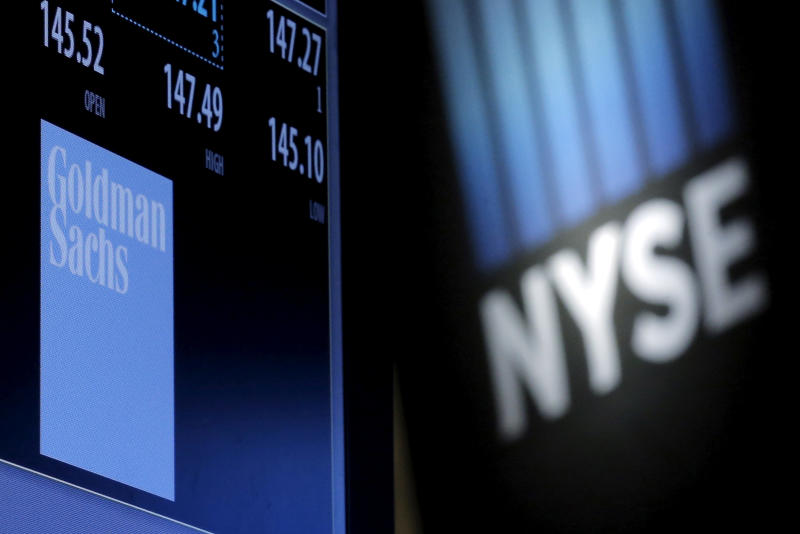Goldman Sachs shares fall most in 7 years on 1MDB scandal and `fear of the unknown'
Sign up now: Get ST's newsletters delivered to your inbox

At least three senior Goldman Sachs bankers have been publicly implicated by the US Department of Justice in a criminal enterprise involving bribing officials in Malaysia and elsewhere and laundering hundreds of millions of dollars.
PHOTO: REUTERS
Follow topic:
NEW YORK (BLOOMBERG) - Goldman Sachs Group's reputation is facing one of its biggest crises of the decade - and now its shares are, too.
Since prosecutors implicated a trio of Goldman Sachs bankers in a multi-billion-dollar Malaysian fraud early this month, investors have endured an almost daily drip of news on the firm's ties to the scandal. The barrage culminated on Monday (Nov 12) as Malaysia's finance minister demanded a "full refund", tipping Goldman's shares into their biggest drop since 2011.
Across Wall Street, analysts expressed surprise over the dive, noting the bank - which hasn't been charged with wrongdoing - can probably stomach any payment that might be extracted in the case. Instead, some said, the decline appeared to be due to a combination of concern over the persistently harsh spotlight and uncertainty about what's to come. It was also a generally bad day in US markets.
"It's not so much the dollar amount," said Mr Gerard Cassidy at RBC Capital Markets. "It's more that we don't know all of the facts yet; we don't know all of the important points to the story at this time. It's the fear of the unknown."
On Nov 1, at least three senior Goldman Sachs bankers were publicly implicated by the US Department of Justice in a multi-year criminal enterprise that included bribing officials in Malaysia and elsewhere and laundering hundreds of millions of dollars. The firm has said it's cooperating with the investigations and may face "significant" fines.
The bank spent years repairing its image after it became a favourite congressional punching bag in 2010 for its behaviour around the global credit crisis. That year, US regulators accused the bank of cheating investors by failing to disclose that a hedge-fund firm betting against a mortgage-linked derivative had played a role in creating what they bought. The bank admitted it made a "mistake" in marketing materials and settled.
The Malaysia probe focuses on the country's scandal-plagued state investment company, 1Malaysia Development Bhd and the US$6.5 billion (S$9 billion) it raised in 2012 and 2013. Goldman Sachs handled the deals, reaping almost US$600 million in fees.
Tim Leissner, the bank's former chairman of South-east Asia, admitted in a plea that he bribed officials to get the bond deals, and that he and others arranged the fundraising as debt offerings to generate higher fees. He also admitted that more than US$200 million in proceeds from 1MDB bonds flowed into accounts controlled by him and a relative. Prosecutors have said that executives involved circumvented the bank's internal compliance operations to avoid detection.
Malaysian Finance Minister Lim Guan Eng on Monday said the country is seeking a refund of all the fees it paid. A bank spokesman declined to comment on the demand.
The firm's shares tumbled 7.5 per cent, their biggest one-day drop since November 2011. The volume of stock bought and sold was more than triple the average amount. The bank was the worst performer in the Dow Jones Industrial Average on a day in which all but four companies in the index declined.
Goldman's litigation risks in the US include lawsuits and probes with estimated costs that could top US$2 billion, including more than US$1 billion from 1MDB matters, Bloomberg Intelligence analysts Elliott Z. Stein and Jennifer Rie wrote in a report on Monday.
Goldman Sachs has said it believed proceeds of the debt it underwrote were for development projects and that Leissner withheld information from the firm. Leissner has said Goldman's culture of secrecy led him to conceal wrongdoing from the company's compliance staff.
Chief executive officer David Solomon, who took over in October, said he found the allegations against the former employees "very distressing". His predecessor Mr Lloyd Blankfein, Goldman's current chairman, was asked earlier this month what the scandal meant for the bank's reputation. He deadpanned: "Well, it's not good."

